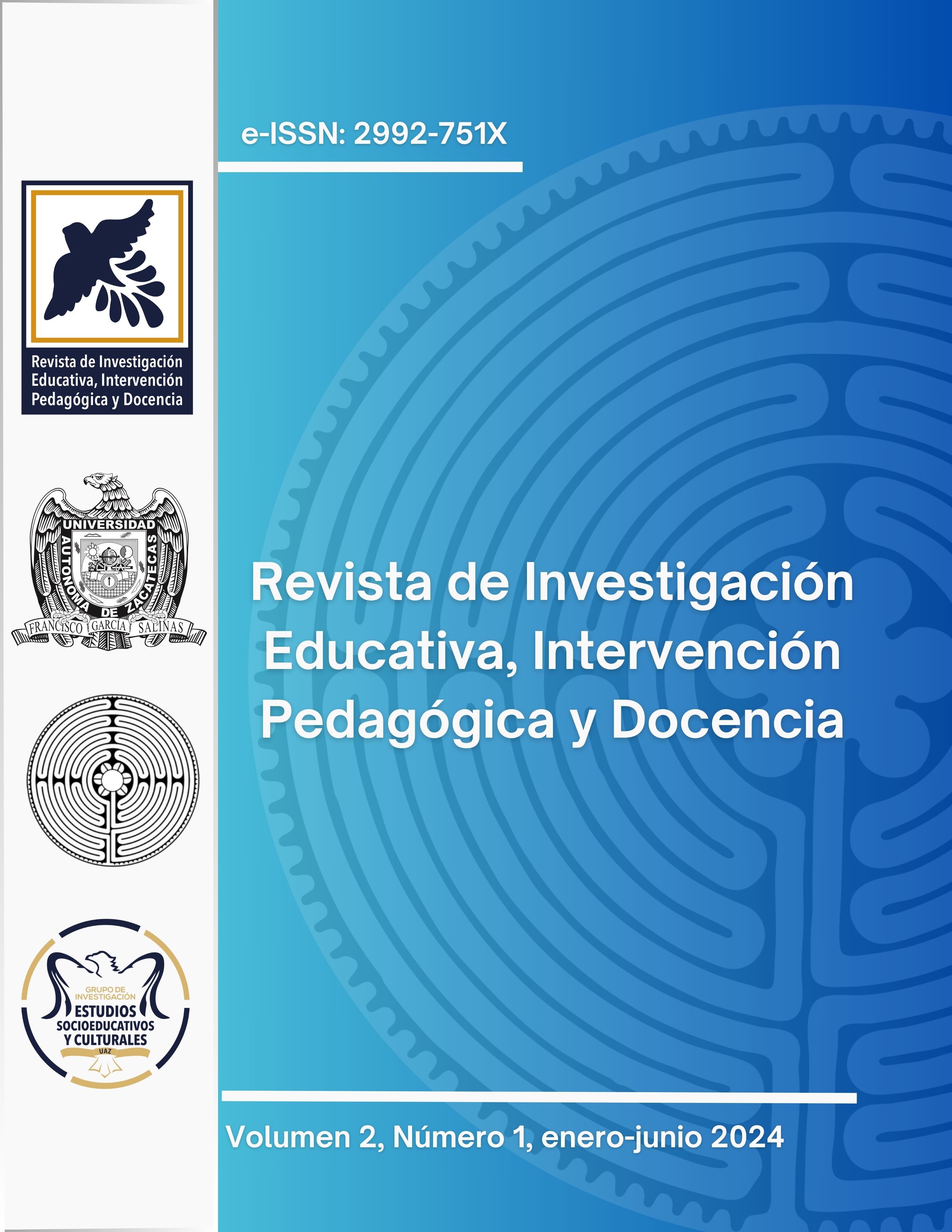Distance education: an emerging pedagogy in higher education institutions in Latin America during the Covid-19
Published 2024-01-10 — Updated on 2025-01-30
Versions
- 2025-01-30 (2)
- 2024-01-10 (1)
Keywords
- Virtual teaching,,
- digital skills,,
- educational innovation
Copyright (c) 2024 Revista de Investigación Educativa, Intervención Pedagógica y Docencia

This work is licensed under a Creative Commons Attribution-NonCommercial-ShareAlike 4.0 International License.
How to Cite
Abstract
This research presents a review of several case studies that describe the reaction of faculty of higher education institutions in Latin American countries such as Argentina, Brazil, Colombia, Uruguay and Mexico, particularly in the state of Zacatecas, during the COVID-19 pandemic. It was based on the premise that the lack of teacher training to work remotely was a problem in itself because it generated emerging pedagogical practices but of a reactive type derived from the urgency of transferring the face-to-face educational model to the virtual, but without having mastery in the use of ICT and extensive knowledge of distance educational resources. Teachers recognized that not only was it enough to teach by videoconference or leave assignments, but that adjustments to teaching materials and methodology needed to be made for successful teaching and efficient learning; Therefore, it had to choose the most suitable and accessible educational digital tools for its students, that is, consider the resources that the students really possessed or had at their disposal and leave behind the planning for face-to-face teaching. The basis of the efficiency of their work was the realization of a good instructional design so that the learning in the students was satisfactory. Despite these valuable efforts, only in Uruguay there was an innovative educational project whose support was teacher training in distance education, consequently, they responded during confinement with a distance model.
Downloads
References
- Álvarez, B. & Álvarez, V. (2014). Métodos en la investigación educativa. UPN.
- Acosta, A. (2013). Colombia: escenario de las desigualdades. Revista de la Facultad de Ciencias Económicas y Administrativas. 14(1), 19-35. http://www.scielo.org.co/pdf/tend/v14n1/0124-8693-tend-14-01-00009.pdf
- Baroni, G. (2022). Los futuros de la educación en Uruguay. En F. Reimers (Coord.). Opciones para reimaginar juntos nuestros futuros. Diálogos por un nuevo contrato social para la educación, 101-107. https://static1.squarespace.com/static/6099240bad6d965251432904/t/6230 b6dbd8afd941a4da12a7/1647359708060/Dialogos.pdf
- Butcher, N. (2015). Guía básica de recursos educativos abiertos (REA). UNESCO.
- Cardoso, M. (2022). Práctica docente virtual en el contexto del sars-covid-19 en la Unidad Académica de Derecho de la Universidad Autónoma de Zacatecas. Revista digital FILHA, 27, 1-24. http://www.filha.com.mx/publicaciones/edicion/2022-07/practica-docente-virtual-en-el-contexto-del-sars-covid-19-en-la-unidad-academica-de-derecho-de-la-universidad-autonoma-de-zacatecas-por-martin-de-jesus-cardoso-perez
- Carranco, S., Pando, M., y Aranda, C. (2019). Riesgos psicosociales en docentes universitarios. Revista Científica Mundo de la Investigación y el conocimiento, 4(1), 316-331. http://recimundo.com/index.php/es/article/view/81
- Chávez, L., Alcalá, L. y Esparza, M. (2022). El desarrollo económico en los municipios de Zacatecas. En S. Vega (coord.), Efectos del proceso de empobrecimiento en la desigualdad y el desarrollo social en los territorios, 543-558. Universidad Nacional Autónoma de México/Asociación Mexicana de Ciencias para el Desarrollo Regional. http://ru.iiec.unam.mx/5819/1/Volumen%20VI%202022.pdf
- Colina, A. (2014). El estudio de caso, una estrategia para la investigación educativa. En A. Díaz, A. y A. Luna, (coords.). Metodología de la investigación educativa. Aproximaciones para comprender sus estrategias, 243-270. Díaz de Santos.
- Consejo Nacional de Evaluación de la Política de Desarrollo Social (2020). Informe de pobreza y evaluación 2020. Estado de México. https://www.coneval.org.mx/coordinacion/entidades/Documents/Informes_de_pobreza_y_evaluacion_2020_Documentos/Informe_Mexico_2020.pdf
- Covarrubias, L. (2021). Educación a distancia: transformación de los aprendizajes. Revista Telos, 23 (1), 149-158. https://doi.org/10.36390/telos231.12
- Espí, A. (2021). Uruguay: el país que supo reducir la desigualdad y la pobreza. Un análisis de su desarrollo social bajo el enfoque de los ODS 1, 5 y 10. https://www.colibri.udelar.edu.uy/jspui/bitstream/20.500.12008/28475/5/Uruguay%20el%20pa%c3%ads%20que%20supo%20reducir%20la%20desigualdad%20y%20la%20pobreza_Espi.pdf
- Fernández, A. y Pinzón, G. (2018). ¿De qué debemos desaprender para cambiar la educación? A. Forés y E. Subias (eds.). Pedagogías emergentes. 14 preguntas para el debate, 37-50. Octaedro-ICE.
- Forés, A. y Subias, E. (2018). Presentación: pedagogías emergentes. 14 preguntas para el debate. En A. Forés y E. Subias (eds.). Pedagogías emergentes. 14 preguntas para el debate, 4-5. Octaedro-ICE.
- García, R. y Madrigal, A. (2022). Procesos de aprendizaje. La formación de docentes como experiencia en la complejidad contextual. En H. Olmeda (coord.). Reflexiones en Investigación Educativa. Educando en el contexto de la pandemia COVID-19, 423-439. Centro Regional de Formación Docente e Investigación Educativa Tamaulipas.
- Grané, J. y Forés, A. (2018). ¿Por qué emergen nuevas propuestas pedagógicas? A. Forés y E. Subias (eds.). Pedagogías emergentes. 14 preguntas para el debate, 27-35. Octaedro-ICE.
- Gutiérrez, A. y Mansilla, H. (2020). La dialéctica entre lo objetivo y lo vivido: el análisis de la desigualdad social en Córdoba, Argentina. Cuadernos del Centro de Estudios en Diseño y Comunicación, (88), 87-109. https://dx.doi.org/10.18682/cdc.vi88.3799
- Jasso, D., Villagrán, S., Rodríguez, M., y Aldaba, M. (2021). Transición de la educación presencial a la educación en línea. Experiencia docente en nivel superior a partir de la pandemia del 2020. En L. Fuentes, T. Ordóñez, T., N. Mendoza y G. Molina (coords.). Herramientas de aprendizaje y experiencias de enseñanza en Educación Superior a partir de la pandemia de 2020, 55-66. ECORFAN. http://ricaxcan.uaz.edu.mx/jspui/bitstream/20.500.11845/2948/1/Herramient as_de_aprendizaje_y_experiencias_TI.pdf
- Kohls-Santos, P. (2021). COVID-19 y educación: Experiencias y perspectivas docentes en la educación superior. Revista Paraguaya de Educación 10(2), 85-101. https://doi.org/10.35362/rie8624344
- Martín J., Gutiérrez E., Bigliani J. y Rocchiete R. (2020). Nuestras prácticas docentes en tiempo de pandemia. Revista de Enseñanza de la Física, 32, 233-240. https://revistas.unc.edu.ar/index.php/revistaEF/article/download/30999/3165 9/102034
- Martínez, J. (2018). ¿Hacia dónde vamos con las pedagogías emergentes? En A. Forés y E. Subias (eds.). Pedagogías emergentes. 14 preguntas para el debate, 7-25. Octaedro-ICE.
- Ministerio de Hacienda, Presidencia de la Nación (2018). Informes productivos provinciales (informe n° 23). https://www.argentina.gob.ar/sites/default/files/informe_productivo_cordoba.pdf
- Montero, R. (2011). El Brasil de la extrema pobreza. Revista CIS, 9(14), 107-116. https://dialnet.unirioja.es/servlet/articulo?codigo=6310282
- Muñoz, V. y De Pedro, F. (2005). Educar para la resiliencia. Un cambio en la mirada en la prevención de situaciones de riesgo social. Revista Complutense de Educación, 16 (1), 107-124. https://revistas.ucm.es/index.php/RCED/article/view/RCED0505120107A
- Villagrán, S. (2022): NOM-035 –STPS. En S. Villagrán, M. Vasconcelos y J. Espinoza, (eds.), Factores de riesgo psicosocial, 13-25. Editorial LEED del Laboratorio de Evaluación y Educación Digital.


